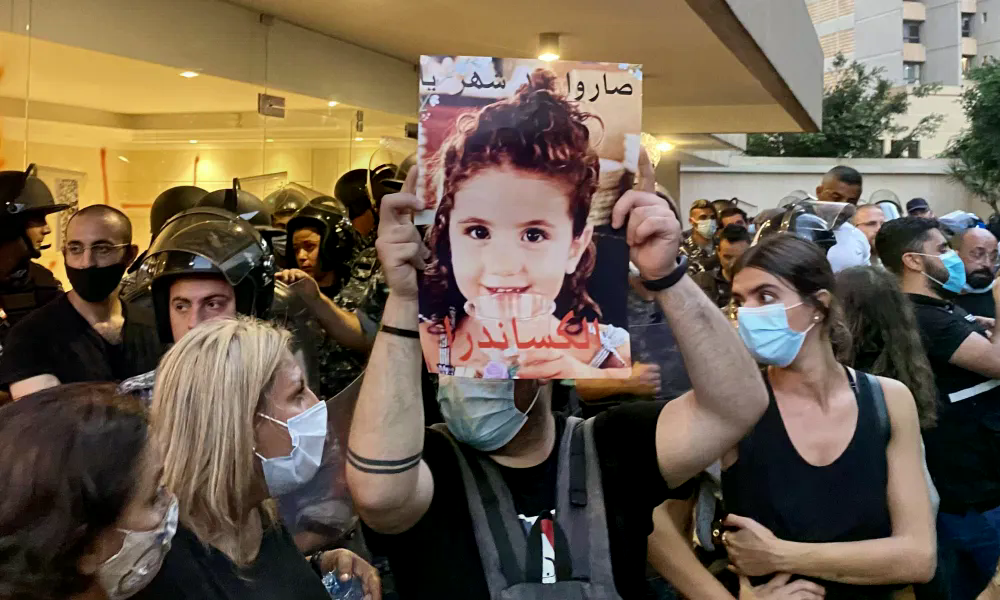Beirut Port blast victims say five years later, justice feels a bit closer

On August 4, 2020, a massive explosion of 2,750 tonnes of ammonium nitrate at Beirut’s port devastated the city, resulting in the deaths of more than 218 people. Among the victims was three-year-old Alexandra Naggear. Five years later, the investigation into the disaster remains mired in delays and political interference.
Tracy Naggear, Alexandra’s mother and a prominent advocate for the victims, emphasized the need for full justice rather than partial accountability. “We won’t accept a half-truth or half-justice,” she said, speaking to Al Jazeera. As the fifth anniversary of the tragedy approaches, there are signs that the judicial process may be gaining momentum after years of obstacles, including resistance from high-profile politicians and procedural roadblocks.
A decision from the lead prosecutor is anticipated soon, according to activists and legal sources familiar with the case. While the path to justice remains long, there is a growing sense of optimism among those involved. “You can feel a positive atmosphere this time,” said lawyer Tania Daou-Alam, who is in Lebanon for the annual commemoration of the blast.
Daou-Alam, who lost her husband in the explosion, is part of a group of nine victims suing the US-based company TGS in a Texas court for $250 million. The lawsuit focuses on holding the company accountable for its role in chartering the Rhosus, the ship that transported the ammonium nitrate to Beirut in 2013. She stressed that the case is about seeking transparency and uncovering the broader chain of responsibility, not just compensation.
Lebanon has long struggled with systemic issues, including a lack of government support during crises. Bombings, assassinations, and a history of impunity have left the population disillusioned. This frustration culminated in an uprising in October 2019, less than a year before the blast. In the aftermath, residents took it upon themselves to clean up the city, while angry citizens rejected politicians who sought to capitalize on the tragedy.
The end of Lebanon’s 15-year civil war in 1990 set a precedent for impunity, as former militia leaders transitioned into political power, often avoiding accountability. Investigations revealed that the ammonium nitrate had been improperly stored at the port for six years, despite being known to top officials, including then-President Michel Aoun.
Judge Fadi Sawan was appointed to lead the investigation in August 2020 but faced resistance when he questioned prominent politicians. Two ministers charged with negligence requested the case be transferred, and a court ruled that Sawan could not be impartial due to damage to his home in the blast. He was replaced in February 2021 by Judge Tarek Bitar, who also faced obstruction from authorities and political figures.
Despite these challenges, Judge Bitar continued to call key figures for questioning and issued arrest warrants for several high-profile individuals, including allies of Speaker of Parliament Nabih Berri. However, their refusal to cooperate and claims of parliamentary immunity have hindered progress.
In early 2025, Lebanon elected a new president, Joseph Aoun, and a new prime minister, Nawaf Salam. Both leaders emphasized the importance of justice for the victims of the explosion. The current justice minister has pledged to support the investigation and ensure no further obstacles are placed in the way of the judiciary.
Human Rights Watch reported in January 2025 that Judge Bitar had resumed his work after two years of being stymied by authorities. In July 2025, President Aoun declared August 4 a day of national mourning, and Prime Minister Salam met with the families of the victims. Aoun stated, “We must uncover the whole truth and hold accountable those who caused this catastrophe.”
In March 2025, the acting public prosecutor, Jamal Hajjar, reversed previous decisions and allowed Judge Bitar to continue his investigation. Legal experts and activists have noted that some individuals implicated in the case are now appearing for interrogations, including former officials such as Tony Saliba, Abbas Ibrahim, and former Prime Minister Hassan Diab.
However, many still believe more needs to be done. Tania Daou-Alam called for laws that protect the judiciary and ensure the appointment of vacant judge positions, stating that such actions would demonstrate the government’s commitment to justice. Despite recent progress, challenges remain, including ongoing resistance from certain political figures and concerns over judicial independence.
Political analyst Karim Emile Bitar noted that accountability is essential for rebuilding trust within the country and its diaspora. “Without trust, Lebanon will not be able to recover,” he said. Yet, he acknowledged that the complexity of the crime may mean that full clarity may take years or even decades.
For Tracy Naggear, the fight continues. “Our fight is mainly for our daughter, for Alexandra, of course,” she said. “But we are also doing it for all the victims and for our country. It’s for every single person that has been touched by the 4th of August, from a simple scratch to a broken window.”


